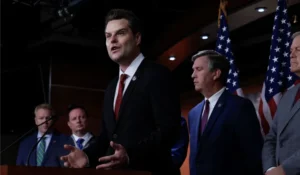Justice Scalia’s Successor
February 13, 2016.
On this day, Justice Antonin Scalia, revered Supreme Court Justice passed away of “myocardial infarction” (in other words, natural causes). In the vicious world of politics, a death is not simply an instance to mourn over. The passing of Justice Scalia triggered a full out political and ideological war between the Republican dominated Congress and President Obama, a Democrat. Previous to Justice Scalia’s death, the Supreme Court was Republican based. As Obama has the presidential power to nominate he or she who will next join the Court, his agenda is to chose a Democrat. The Congress’ agenda is just the contrary. It is the belief of the Republican party that, in order to preserve the Second Amendment (the right to bear arms), it is crucial that the Supreme Court retains its conservative majority.

Now we are presented with a predicament: the president has the power to nominate whomever he wishes – presumably a Democrat – for the position. The Congress has vowed to veto every nominee, saying that, as Obama’s final term is nearly complete, it is not his right to chose who will next join the Supreme Court.
Alas, yesterday marked the first of what will, in all probability, be a long string of conflict between President Obama and congress. The president declared that Merrick Garland, the U.S. Court of Appeals for the District of Columbia Circuit’s lead judge, to be his nominee for the Supreme Court. He dared Congress not to accept him, as they pledged to. However, Congress has remained steadfast, staying firm in their decision that a new Justice will not be permitted until a new President graces the halls of the White House.
In a statement the Senate Majority Leader, Mitch McConnell he stated:
“It is a president’s constitutional right to nominate a Supreme Court justice and it is the Senate’s constitutional right to act as a check on a president and withhold its consent,” Senate Majority Leader Mitch McConnell said on the Senate floor.”
Meanwhile, President Obama’s beliefs are on the contrary. At the Rose Garden ceremony, made a statement in which he said:
“I’ve selected a nominee who is widely recognized not only as one of America’s sharpest legal minds, but someone who brings to his work a spirit of decency, modesty, integrity, even-handedness, and excellence.”
So here we have two incredibly contradictory and conflicting points of view. With both the Executive and Legislative branches exercising their Constitutional rights of nominating a Justice and, thusly, vetoing that nomination -respectively- it would seem as if our government is stuck in a political deadlock.
On goes the ever enthralling world of American politics.








